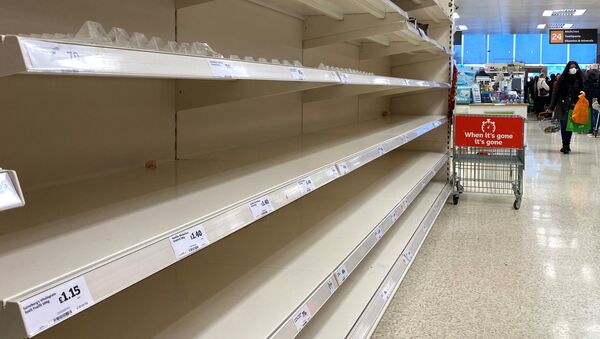Coronavirus hoarders in the US and some other countries have scooped up so much toilet paper that Halloween mummy costumes may witness a revival this year, but there’s a tangible risk that some niche products, especially those made abroad, will vanish from the shelves for a while.
The United States this week began widespread closures of schools and universities; restrictions have also been put on many public places and businesses, with industries across the nation focusing on remote work where it is possible.
With more and more Americans choosing to stay home, panic buying of basic supplies to sit out the pandemic has become a thing. Coupled with the slowing manufacturing and stressed supply chains, public concern has grown over whether the US could run out of food.
There'll be enough bread for everyone. Pasta - not so sure
“The US produces a huge amount of food. We’re also an exporter of food, so we’re going to be okay,” supply chain project management expert Daniel Stanton told CNBC’s Make It.
The US Food and Drug Administration has a similar take, but Stanton warned that some products could be scarce nevertheless.
“The brand that you normally want may not be available,” he said. “But, hey, there’s some other kind of pasta. Or instead of rice, we're going to have potatoes for dinner.”
There will likely be no problem with supplies of staples like milk, eggs, cheese, bread and meat, but things could get “a little tricky” with foreign-made specialty goods, according to Professor Anantha Iyer of Purdue University in West Lafayette, Indiana.
Those include Italian pastas and wines, French cheeses, and other niche food products. “Some ingredients for nearshore specialty things could get shut off because they can’t come across the border,” he added.
It all depends on food safety watchdogs
There has been no evidence that food or packaging can transmit the COVID-19 virus, which is thought to be mainly passed on from person to person, but the pandemic may still prompt more scrutiny of exports and slow down the supply chain, food safety consultant Brandon Hernandez told CNBC.
He believes that “raw materials or packaging coming out of China that support the broader food chain” will be a source of major concern.
“I’m not saying that it’s impossible that you won’t see bananas become scarce or strawberries in the back half of the year, because they shift from California production to Mexico production,” he cautioned.
“Maybe it’s possible, but it really depends on what they decide to impose at the borders from the [Food and Drug Administration] and the [United States Department of Agriculture] standpoint.”
The number of confirmed coronavirus cases globally passed the 200,000 mark on Wednesday; more than 8,000 people have died from the respiratory disease the virus causes and over 80,000 have recovered. The United States has been among the worst-hit countries, with over 9,200 cases and 150 deaths reported so far.




